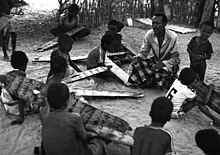Khalwa (school)
While the khalwa provides free meals, drinks, and accommodation, and has been considered integral in addressing illiteracy; investigative reports have revealed that some of these institutions have been involved in child abuse practices, including sexual assault,[1][2] corporal punishment,[3] torture and forced labour.
The Funj Sultanate appeared in the early sixteenth century, and the khalwa was introduced before or during the rule of sheikh Ajib Al-Mangalik [ar] (1570–1611).
[4] They teach children to read, write, and memorise the Qur’an, as well as Arabic, Quranic studies,[11] and Islamic jurisprudence (Fiqh).
[14][23] The khalwa is similar to the Kuttab in Egypt and Pesantren in Indonesia, but they differ in their origin, their building architecture and the schooling system.
The student must bring ink (called "Al-Amar"), and they use materials available in the environment but typically it is made from mixing gum arabic with coal ash.
[24] The khalwa is built from materials found locally like mud, red bricks, stones and wool.
The khalwa, in most cases, is in the form of a rectangular room that contains a small bed; they make a place to put the boards.
The day begins with a period called the “Daghishah,” before the Fajr prayer, during which each student memorises the Koranic verses in his individual schedule.
This drilling continues and is repeated until the sheikh commands the student to step to one side and proceed to memorise what was written.
Mondays are dedicated to bringing firewood to light a fire at night, or "Al-Taqabah", and it is called the day of Al-Fazaa.
On Wednesday, the process of accepting new students takes place, exams are held, food (or alms) of grains, dates, or money are distributed.
[37] In 2015, the director of the Safe Child organisation, Siddiqa Kubaida, alleged that two children were raped in two khalawi in Khartoum North and Shambat, by two sheikhs.
[38] In 2016, in an interview with Al-Araby Al-Jadeed, Sheikh Fadlallah Muhammad Zain, one of the graduates of the khalwa system, acknowledged that flogging is the most widespread punishment for kids who do not memorise their daily course from the Qur'an.
[39] In 2020, a BBC report about khalawi, shocked many, inside or outside Sudan, due to the painful scenes of violence and ill-treatment of students.
[4][40] The BBC Arabic investigation, revealed that children, under the age of five, were subjected to systematic abuse, including being chained, whipped, shackled, forced to sleep naked on extremely hot iron surfaces, and confinement in dark rooms, with deprivation of food and drink, and sexual assault.
[42] By December 2020, the film had led to a major public reaction in Sudan, with legislative changes and governmental promises of prosecutions.
The journalistic investigation indicated that families of victims are generally afraid to report incidents of sexual and physical abuse, as most sheikhs are well respected and feared in the community.
[1] The sheikh was sentenced to 15 years for sexual harassment and harm, and not rape or pedophilia, which was criticised by lawyers and children’s rights experts.
[1][44] Yasser Moussa, a mental health specialist and expert in the field of children’s rights, believes that Al-Khalawi in its current form perpetuates a vicious cycle of child abuse, because most of the students depend on sheikhs who are also a khalwa graduate that may have gone through similar physical or sexual abuse, which make them have more ability to apply the same practices they were exposed to during their childhood.
[44] Political analyst Huthaifa Al-Jallad said: “Through my direct and personal observations of one of the khalawi near my house; I noticed that the sheikh sends his children to modern schools, while he exploits his students in work inside the khalwa, perform various household chores inside the sheikh house, and bringing alms.





